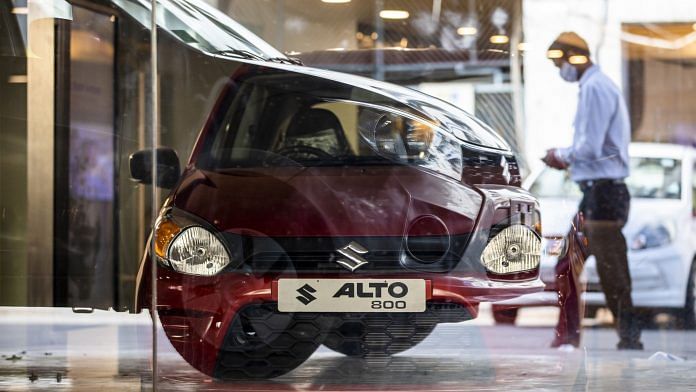New Delhi: Maruti Suzuki India Ltd., the nation’s biggest carmaker, reported better-than-expected quarterly income, as higher vehicle prices and cost cuts boosted margins.
Net income was Rs 10.1 billion ($135 million) in the three months ended Dec. 31, compared with Rs 19.4 billion a year earlier, the unit of Japan’s Suzuki Motor Corp. said in a statement Tuesday. The average estimate of analysts tracked by Bloomberg was for profit of Rs 9.1 billion. Revenue of Rs 232.5 billion beat the Rs 231.1 billion forecast.
Maruti shares jumped Rs 6.8% to 8,602.60 in Mumbai, reaching their highest level since September 2018. It was the best performing stock of the day on the S&P BSE Sensex.
The automaker raised prices of some models including its popular Swift last year to help offset higher input costs.
With production slowing due to a global shortage of semiconductors, Maruti said “there was no lack of demand” and 240,000 customers were awaiting delivery of vehicles as of the end of December.
Local sales of cars and SUVs are expected to post double-digit volume growth in the two years to March 2024, which will support Maruti’s business, Mitul Shah, head of research at Reliance Securities, said in a note. Sales of premium products will also increase, he said.
Challenges remain
While Maruti said it is expecting vehicle production to increase in the fourth quarter, it won’t reach full capacity. The chip crunch resulted in lost production of about 90,000 vehicles last quarter, it said, adding that the electronics supply situation is gradually improving.
Higher raw material costs are also hurting the global auto industry, while stricter emissions rules in India, due to kick-in this year, may hit sales by making vehicles more expensive. The spread of omicron has further dented hopes of a rapid recovery.
The stricter emissions rules will be a bigger hurdle for Maruti as it doesn’t sell electric vehicles and is lagging other carmakers in the shift to cleaner offerings. Its competitor Tata Motors Ltd. is doubling down on EVs with plans to launch 10 battery models by 2025. Mahindra & Mahindra Ltd. sells one model, the e-Verito, and is planning to roll out eight more by 2026.
Given the high upfront cost of batteries and limited charging infrastructure in India, hybrid vehicles are more scalable than electric models and a “very powerful” solution for reducing carbon emissions in the medium-term, Rahul Bharti, an executive director of corporate affairs at Maruti, told analysts in a post-earnings call. Maruti will pursue EV in the long-term, he said.
Maruti’s local sales in the quarter through December fell to 365,673 units from 467,369 a year earlier, according to the statement. Its parent Suzuki cut January output by about 15% due to difficulties in sourcing parts and halted three plants in Japan earlier this month.-Bloomberg
Also read: Maruti Suzuki increases vehicle prices by upto 4.3 per cent due to rise in input costs



